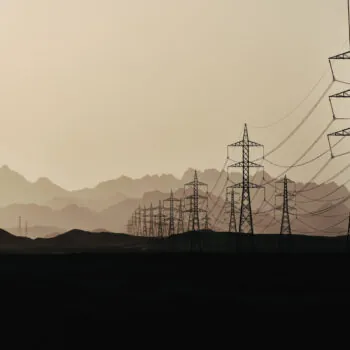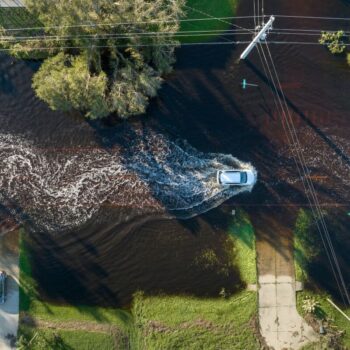Greens are rallying against a Brexit. From familiar faces like Stanley Johnson and Caroline Lucas, to groups like the Wildlife Trusts, Greenpeace and Friends of the Earth, environmentalists are mobilising voters and making the case for ‘in’.
Predictably, they are now coming under attack from ‘out’ campaigners, who claim that charities in particular should not have the right to take sides in the referendum debate. Yet the green groups’ arguments are powerful for the simple reason that they can point to facts on the ground. European laws help keep our beaches and drinking water clean and protect our forests. European leadership helped secure last year’s global climate deal – something many believed impossible.
But before we conclude that staying in is a green ‘no-brainer’, we should be prepared to address the ‘why’, as well as the ‘what’ of European protection. Why turn to Brussels, when we could make laws of our own? Why rely on the EU when ‘subsidiarity’ (the idea of doing things at the most local level possible), is a defining principle for many greens?
In looking for answers I believe we will find a compelling case for continued European co-operation; but also a pattern for a different kind of Europe – one which seeks to give people more control over their lives, and a more active role in building our future economy.
But first let’s examine the EU’s green balance sheet.
The catalogue of successes is impressive. European rules stop raw sewage being pumped into the sea; they control health risks from dangerous chemicals and maintain a world-beating network of protected nature areas. We are healthier and better off as a result of these protections, in many cases championed by British politicians such Johnson and Lucas.
However, there are ‘outers’ who claim that the damage done by measures such as the Common Agriculture and Fisheries Policies outweighs these benefits – and there is a case to answer.
A mass of evidence does indeed demonstrate that industrialised farming has been bad for wildlife, soil and water quality. And experience suggests that controlling the minutiae of land management decisions through prescriptions made in Brussels is often clumsy, if not down-right destructive.
But before we blame all of this on the CAP, we should remember that agricultural intensification has transformed farming systems across the developed world, not just in Europe – the result of technological change as much as political intervention. Moreover, without Government support today, farming in large parts of Britain would cease altogether, unable to compete with cheaper food imported on the open market.
Some ‘Outers’ claim we could deal with this by making national support payments, but with 70% of farm exports currently going to the EU, a Brexit could still put many farmers out of business. The likely result would be the loss of many traditional landscapes, thousands of jobs, and a centuries’ old working relationship with the land. I (for one) would much rather wildlife returned to our farms through a renewed covenant between the public and farmers. But to achieve this requires a system in which farmers can make a living whilst protecting nature; a system that will be much tougher to achieve if we retreat into isolation, or surrender entirely to the global market. Building a better CAP might be a tough option, but it is the one most likely to get the job done.
The more salient question, then, is whether a reformed CAP is capable of greater subsidiarity – allowing communities to shape land-use in a way that respects local traditions and a sense of place. Part of the answer might lie in looking at models of democratic engagement that already exist in the canon of European thought and law-making. EU laws on water management (for example) aim at radical levels of public participation – but have been neglected by our own Government and its Agencies. Greater devolution and civic involvement in decision making would be a bold move forward for the CAP.
The history of the Common Fisheries Policy offers similar lessons. The unreformed CFP damaged the marine environment and put fishing communities on their beam-ends. But the reality is that fish do not keep still, and can be caught beyond our boundaries; and so our industry relies for its survival on responsible behaviour by our neighbours. A UK outside Europe would have much less ability to influence this – which is why it was such a breakthrough when recent reforms of the CFP returned day-to-day management of fish stocks to coastal communities, but with a strengthened commitment to conservation.
Despite their failings, the CAP and the CFP in fact illustrate why European co-operation on the environment is necessary. We need shared approaches to tackle trans-boundary problems like the stewardship of fish stocks and the maintenance of habitats for migratory birds. And if we want market access and a level playing field for our businesses without a race to the bottom, we need common environmental rules.
But these policies will only be workable in future if the EU puts much greater trust in its citizens – giving them the power to come up with locally sensitive solutions that contribute to the common good. And this in turn requires not just a change of culture, but also real vision; because alongside a programme of democratic reform, Europe also needs a plan to revive its flagging economy, and address the humanitarian and security challenges on its doorstep. The question for greens, is what role should the environment play in both?
The contribution of environmental harm to the toxic mixture of hunger, political instability, conflict and extremism that is currently shaking North Africa and the Arab region is well-understood and documented. In particular, the role of drought as a driver of the current crises has been carefully explored. This has motivated security chiefs in the US to become advocates for action on climate change, and development organisations to campaign on climate, at the same time that they struggle with mounting problems on the ground.
All this also makes a strong security case for continued European leadership in this area – but securing global co-operation on such a ‘wicked’ problem as climate change is notoriously difficult; it requires efforts over years to build trust in shared solutions. Europe has provided this leadership precisely because of the sense of common purpose that is possible when countries invest in a long-term project like the EU. If the UK were to leave, not only would our influence over this issue diminish – but we would also diminish the influence of Europe as a whole – making it more difficult to ensure implementation of the Paris agreement, for example. We would all – every citizen in Europe and beyond – lose out as a result.
But tackling climate change is not just a question of international diplomacy; it also represents a huge opportunity for Europe to re-build its domestic prosperity. With a global economic slow-down looming, it looks likely that the response will depend at least partly on renewed investment in infrastructure. This could see trillions of dollars poured into the energy economy, at a time when the world is experiencing a technological revolution.
Smart grids, electric vehicles, batteries and cheaper renewable power are breaking the mould of the energy system. Europe can be a beneficiary of this new order – slashing imports, improving competitiveness and dramatically reducing fuel demand. It can also lead the way in liberating the ‘prosumer’ – individuals and communities that generate and sell their own energy, and own a stake in the rapidly expanding clean technology sector. The reforms necessary to unleash this wave of innovation are backed both by environmentalists and the advocates of energy market liberalisation. They also offer an anti-dote to the centralising force of the EU, by channelling the potential of new technologies into the diffusion of power.
But the UK’s slice of this action will be massively reduced if it cuts itself off from Europe. Outside of the EU, we will either lose access to energy European markets and grids, or be obliged to obey EU rules with little or no ability to influence them. It will be our citizens who will suffer if we cannot shape electric vehicle markets to suit our car industry, or European power grids to benefit our offshore wind fleet.
The Brexit referendum is not a moment to shut down debate or avoid difficult questions; instead it should free all of us to interrogate everything about the old EU, and to reach for something better. In doing so, we can imagine and create a new Europe – of innovation, industrial opportunity and devolved power. Our own country can and should be at the heart of this project. And that heart can – and should – be green.


